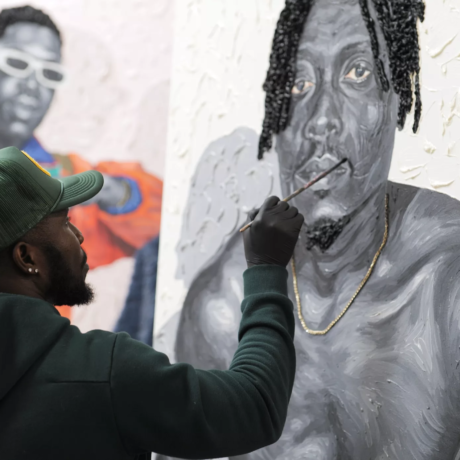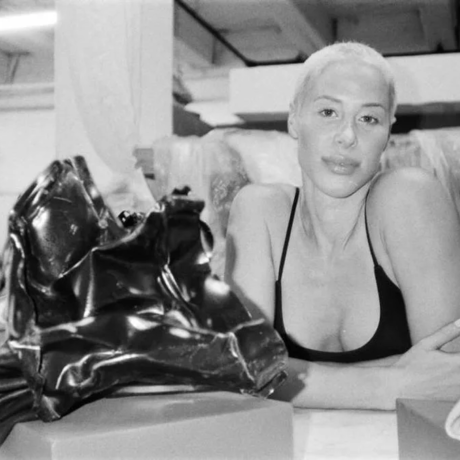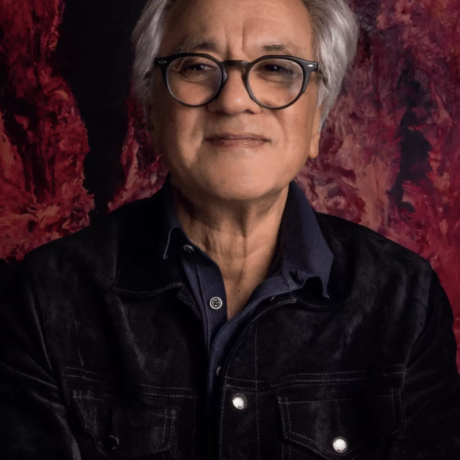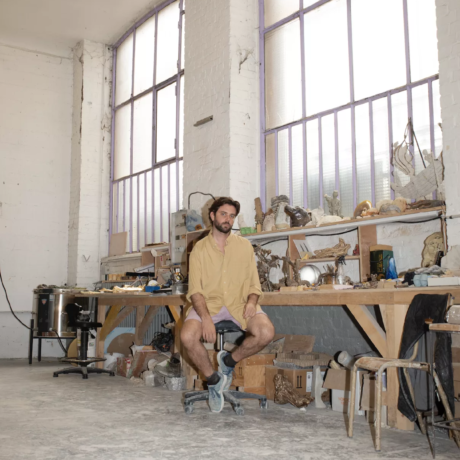View this post on Instagram
The art world is a notoriously difficult industry to break into, particularly for an emerging artist fresh out of art school. The recent success of one young anonymous painter, a recent graduate of Central Saint Martins and the Royal Drawing School who goes only by the name of ‘Rhed’, might seem surprising then. He has three solo shows at Tanya Baxter Contemporary in Chelsea, West London, under his belt already, and the gallery hosted a private dinner in celebration of the artist during the recent Art Basel Miami.
But the revelation this month on the PageSix site that ‘Rhed’ is none other than Rocco Ritchie, the son of Madonna and Guy Ritchie, has raised eyebrows. Just how much of a hand have his famous parents had in his path to becoming an artist who sells works for five figures? Mother and father both attended his debut at Tanya Baxter Contemporary in 2018, and Rhed undoubtedly had a privileged upbringing, described elusively by the gallery as “an eclectic cultural background, with a childhood spent between New York and London.”
The powerful cultural milieu in which the family moves is reflected in the lofty endorsements of Rhed’s work on the gallery’s website. “Rhed is 20, which is good fortune,” states Godfrey Barker, a former art market correspondent for the Daily Telegraph. “He is an authentic, pure, and undiluted product of the 21st century. For me he is a genuine original who paints for his generation as well for himself.” The gallery goes so far as to describe Rhed as “the new Basquiat”, while another critic deems him an artist who “speaks for the millennial generation.”
“The remarkable opportunities that Rhed has benefited from are integral to his success. To conceal this in his biography does a disservice to artists everywhere”
It is challenging to comprehend exactly how the child of two immensely rich and famous individuals could lay claim to being the voice of a generation. As of 2022, Madonna’s net worth is roughly $850 million (£630 million), making her one of the richest singers in the world. Rhed, the gallery coyly tells us, had “early exposure to many artistic disciplines, from cinema to performing and visual arts.” It continues: “As a teenager, he was fascinated by cinema, inspiring him to create storyboards, short films and fine art photographs. He has also always loved music and feels it is an integral element of his art.”
Madonna famously arrived in New York in 1978, alone at 20 years old and with $37 to her name. It wasn’t until 1982 that she signed to a record label. At the same age Rhed is already selling his paintings for upwards of $20,000. The gulf between mother and son’s experience of making their way in the world is stark. The remarkable opportunities that Rhed has benefited from in his sheltered upbringing, which most couldn’t even begin to imagine, are integral to his success. To not only negate but to set out to conceal this in his biography does a disservice to artists everywhere.
View this post on Instagram
Of course, it is not difficult to understand why Rhed might have wished to hide his identity. In a world where celebrity sells, it was inevitable that his family connections would overshadow his work. Yet the artist’s own references to the “beauty in the struggle of life” hit differently in light of his unmasking. “Life bears no pretty face,” he says. “Happiness is not just money and get rich quick. Pain and sadness are part. Beauty is hidden in this struggle.”
“Yes, Rocco, you may feel that you’ve had it hard. But, as Jarvis Cocker sang, “‘You’ll never fail like common people. You’ll never watch your life slide out of view’”
The image of the starving, struggling artist is now so embedded in our culture that it’s not only a cliché but a model to aspire to. At a time when Basquiat originals sell for $93.1 million, and a painting by the formerly homeless graffiti artist has been featured in a Tiffany’s ad fronted by Beyoncé and Jay-Z, it’s clear that to come from poverty is even seen by some as a mark of greatness. For those who do come from wealth, acknowledging their own structural advantages in life might be seen as a distraction from the uniqueness of their own individual creative talents.
Yes, Rocco, you may well feel that you have had it hard. But, as Jarvis Cocker sang in Common People, “You’ll never fail like common people. You’ll never watch your life slide out of view.” With the privilege that Ritchie possesses, he can take greater risks and invest more time in projects that may never work out, secure in the knowledge that the safety net of vast wealth is there to catch him if he falls.
Rocco Ritchie is arguably just another product of a broken system that permits those with money and connections to climb quickly. The art world is notoriously nepotistic, with the children of artists, pop stars and gallery owners frequently lauded as the next great thing. It’s a place where a family connection frequently provides a foot in the door.
“Rocco Ritchie is arguably just another product of a broken system that permits those with money and connections to climb quickly”
Rhed’s work, while energetic, does not stand out within a crowded market. As The Guardian’s art critic Jonathan Jones puts it, “Painting takes work. It therefore seems a shame that Rhed has been put into the public eye when he’s just not, at this point, a real artist. These daubs are amateur stuff, vaguely imitating Picasso or Modigliani, that could have been done by a million young people.”
Following the furore around Rhed’s true identity, all eyes are on the young artist. It is likely that his work will sell when it goes on show at the London Art Fair later this month. But his rapid ascent may now be matched by a swift downturn in public opinion, perhaps offering the first dose of true humility that the young artist has been forced to swallow.
Ritchie isn’t the first celebrity child to take premature leaps in the creative industry, and he certainly won’t be the last. As Doris Lessing once said, “Some people obtain fame, others deserve it.”
Louise Benson is Elephant’s deputy editor
Art-World Opinion
Read more stories from Elephant, offering a fresh perspective on the creative industry
EXPLORE NOW





